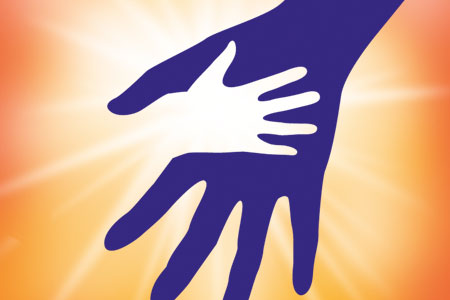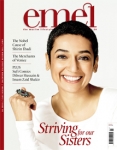
Parents and the Path to Paradise
Issue 90 March 2012
In March, mothers and women come under focus. But the Qur’an has been singing their praises for centuries.
March is the month of International Women’s Day, and in many countries the month of Mother’s Day too. They have got me thinking about how we deal with both motherhood and parenthood within Muslim communities.
We all know the famous sayings from the blessed Prophet that is commonly quoted, “Paradise lies beneath the feet of the mother.” Another story is about when the Prophet was asked which parent to obey, he replied “Mother”, then “Mother”, once more “Mother” and only then “Father”. And the beautiful saying in which God expresses His love for human beings in the way a mother loves her child, describing His love as seventy times greater than a mother’s love. It gives a divine shimmer to the care with which a mother nurtures her child. These religious edicts weigh heavily on children, but they are just as much a responsibility on mothers to ensure they convey the Divine message to their children. If Paradise is beneath a mother’s feet, then the duty to provide a peaceful environment that offers contentment and joy is part of our responsibility. I speak as a new mother here, reflecting in the very first instance on my own home and my own child’s upbringing. If my child is to flourish under the shadow of my love, then I need to explore what that love means, and how to deliver it to my child. There are no easy answers.
However, it is important to stress that a mother is not alone in bringing up a child. No father today can shirk his parental duties; no father can, as in times past, say, “that is the mother’s job.” Children are hugely influenced by the father, and the best role model of this is of course the blessed Prophet himself. His relationship with his daughter Fatima offers us clues on the softer skills of parenting. He referred to her affectionately as, “the mother of his father”, thereby elevating her status and ensuring his respect for her was clear to her. He would stand when she entered the room. How many fathers do you know would do that? Would they, instead, dispatch her off to the kitchen and berate her if the house has not been tidied?
It is enlightening to explore the parent-child role models we have in the Qur’an. Prophet Noah feels deeply that his son is going astray and attempts to save him in the Ark, but is commanded by God to leave him to his own fate. It is understandable that parents wish to employ their wisdom to guide their children away from what they perceive are mistakes. That is why these stories are important for parents, crucial in explaining that parents must make best efforts to guide their children, but must ultimately allow them to make their own choices.
In an environment where parents may find themselves in a new culture, a culture which their children, however, feel at home in, parents may wish to tightly control their child’s decisions, but this is not the Islamic way. Prophet Muhammad advises, “The child is the master for seven years; and a slave for seven years and a vizier for seven years.” This indicates that by the time the child reaches the mid teenage years they became a parent’s advisor, support, ally, and friend. The Prophet continues, “If he grows into a good character within 21 years, well and good; otherwise leave him alone because you have discharged your responsibility with God.”
It is a hard lesson for parents, especially after a lifetime’s sacrifice. However, this trust in our children and their choices is of utmost importance. Ultimately, this trust that we have brought up our children as best we can depends on trust in God — tawakkul. We can return to the Qur’an to see the trust that Moses’ mother places in God as she sends her baby in a reed basket along the Nile, into the very arms of Pharaoh. Yet God reunites them.
Our children live in different times to our own, and therefore need different skills to succeed materially and spiritually. The best we can do is love them, guide them, and prepare them not for our world, which is passing, but for the world in which they will live.
Shelina is the author of Love in a Headscarf, and writes a blog at www.spirit21.co.uk
Bookmark this |
|
Add to DIGG |
|
Add to del.icio.us |
|
Stumble this |
|
Share on Facebook |
|
Share this |
|
Send to a Friend |
|
Link to this |
|
Printer Friendly |
|
Print in plain text |
|


Comments
0 Comments